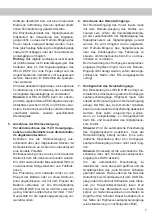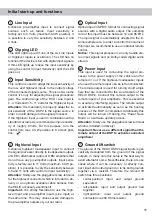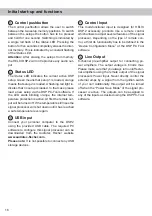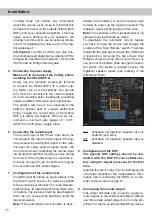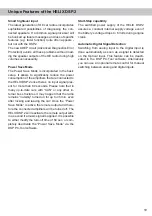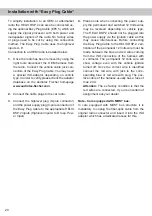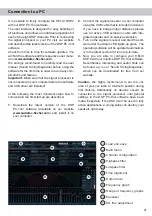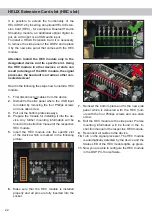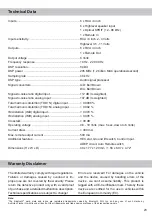
20
Installation with “Easy Plug Cable”
To simplify installation to an OEM or aftermarket
radio the HELIX DSP.2 can also be connected us-
ing the optional Easy Plug Cable (EPC 5) which will
supply the signal processor with both power and
loudspeaker signals of the radio. No factory wires
or plugs need to be cut by using this connection
method. The Easy Plug Cable uses the highlevel
inputs A - D.
Connection to an OEM radio is detailed below:
1.
Once the radio has been removed by using the
right tools disconnect the OEM harness from
the radio. Connect the vehicle cable jack con
-
nectors of the Easy Plug Cable. You may need
a special ISO-adaptor depending on vehicle
type. In order to verify please check the adaptor
database on the Audiotec Fischer homepage
www.audiotec-fischer.com
.
2.
Connect the cable plugs to the car radio.
3.
Connect the highlevel plug (8-pole connector)
and the power supply plug (4-pole connector) of
the Easy Plug Cable to the appropriate HELIX
DSP.2 inputs (
Highlevel Input
A to D resp.
Pow
er Input
).
4.
Please note when connecting the power sup-
ply the permanent and switched 12 Volts wires
may be reversed depending on vehicle type.
The HELIX DSP.2 should not be plugged into
the power supply via the ignition cable as this
may cause interferences. Before connecting
the Easy Plug Cable to the HELIX DSP.2, veri
-
fication of the permanent 12 Volts wire must be
made between the blue and red wires coming
from the ISO connectors of the harness with
a voltmeter. The permanent 12 Volts wire will
show voltage even with the vehicle ignition
turned off. Once the correct wire is identified
connect the red wire with jack to the corre-
sponding blue or red wire with plug. The pos-
itive cable of the harness usually has a fuse of
max. 20 A.
Attention:
The ex factory condition is that the
red wires are connected. If you’re uncertain of
assignment ask your dealer.
Note - Cars equipped with MOST bus:
In cars equipped with MOST bus structure it is
mandatory to unplug the fiber-optic cable from the
original radio connector and insert it into the ISO
adaptor which has a dedicated recess for this.


